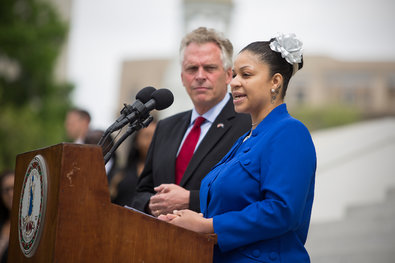
Should Felons Ever Be Allowed to Vote?
With more attention focused on the effects of high rates of imprisonment on African-Americans, Gov. Terry McAuliffe of Virginia restored voting rights to more than 200,000 convicted felons on Friday. Virginia had been one of 12 states that barred or severely limited the ability of felons to vote after leaving prison. Some have estimated that these laws keep one in 13 African-Americans from voting. Should these laws be ended?
* effect = 영향; 결과, 효과/ imprisonment = 투옥, 구금, 구속, 감금/ African-American[Afro-American] = (아프리카계) 미국 흑인(의)/ Gov[= Governor; Government] = (미국에서) 주지사/ restore = (건강・지위 등을) 되찾게[회복하게] 하다; (이전의 제도・법률 등을) 부활시키다/ voting right = 의결권/ convicted = 유죄로 선고된/ felon = (특히 美 법률) 중죄인, 흉악범
 유죄선고를 받았던 흉악범이 출소 후 의결권 행사를 못하게 하는 법은 폐기되어야 하나요?
유죄선고를 받았던 흉악범이 출소 후 의결권 행사를 못하게 하는 법은 폐기되어야 하나요?
1. If You Can’t Follow Laws, You Shouldn’t Help Make Them
The right to vote should only be restored to felons on a case-by-case basis after a person has shown that he or she has truly changed.
2. Felon Disenfranchisement Is Anti-Democratic
Racial disparities in the U.S. criminal justice system keep one out of every 13 African-Americans from voting.
Sample Essay
If You Can’t Follow Laws, You Shouldn’t Help Make Them
We have certain minimum standards of responsibility and commitment to our laws before entrusting someone with a role in the solemn enterprise of self-government. People who commit serious crimes against their fellow citizens do not qualify.
More succinctly, if you won’t follow the law yourself, then you can’t make the law for everyone else, which is what you do – directly or indirectly – when you vote.
The right to vote can be restored to felons, but it should be done carefully, on a case-by-case basis after a person has shown that he or she has really turned over a new leaf, not automatically on the day someone walks out of prison. The unfortunate truth is that most people who walk out of prison will be walking back in.
The arguments in favor of automatic felon voting are unpersuasive. The fact that a disproportionate number of felons at some point in time belong to a particular racial group does not make disenfranchisement racist, just as most felons being male and young does not make these laws sexist or ageist. And while a disproportionate number of felons are black, their victims likewise are disproportionately black, so minimizing the consequences of crime and empowering criminals also has a disparate impact on their law-abiding African-American neighbors.
If there were any evidence that a state’s disenfranchisement law is truly discriminatory, it would be considered unconstitutional under Supreme Court rulings. The fact that it has been years since such laws have been successfully challenged in court – despite there being no shortage of organizations, starting with the Obama administration’s Justice Department and the Democratic Party, that would be eager to do so – shows this evidence is nonexistent.
It’s claimed that, once released, felons should be re-enfranchised because they have “paid their debt to society.” But this phrase is misleading, since in many respects we don’t ignore a criminal past – for example, in allowing someone to buy a gun.
Finally, it’s argued that re-enfranchisement may speed the reintegration of felons into civil society. But automatic re-enfranchisement actually misses the opportunity to do so.
A better approach is to wait some period of time to ensure that the felon has actually turned over a new leaf. At that point, a ceremony – rather like a naturalization ceremony – where he is congratulated in front of friends and family and re-enfranchised would be moving and meaningful.





![]() 유죄선고를 받았던 흉악범이 출소 후 의결권 행사를 못하게 하는 법은 폐기되어야 하나요?
유죄선고를 받았던 흉악범이 출소 후 의결권 행사를 못하게 하는 법은 폐기되어야 하나요?






